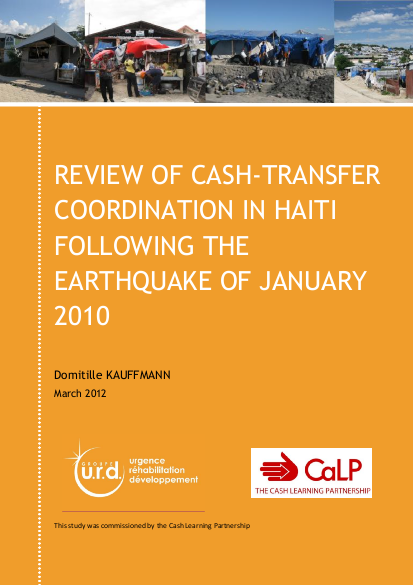
Following the earthquake of January 2010 which hit the Haitian capital Port-au-Prince and neighbouring cities, humanitarian organisations chose to implement Cash Transfer Programmes (CTPs), Cash-For-Work (CFW) programmes, and direct cash transfer programmes and coupon distributions as the markets in Port-au-Prince had the potential to meet the needs of those affected by the disaster. Humanitarian coordination was rapidly put in place through the cluster approach. Certain NGOs, including members of the Cash Learning Partnership (CaLP), organised an ad hoc coordination mechanism for CTPs. This study, which was commissioned by the CaLP, aims to review and document the coordination of cash transfer programmes implemented from the emergency phase in Haiti. It is part of a wider review of CTP coordination in emergency situations which includes 3 case studies (Pakistan, Haiti and the Horn of Africa). The earthquake in Haiti is an example of a large-scale natural disaster in an urban environment where there is little knowledge about CTPs in the country prior to the crisis.
Resource collections
- Earthquakes
- Evaluating humanitarian action
- Innovation
- Learning from crises
- Monitoring and Evaluation (M&E)
- Monitoring of humanitarian action
- UN Habitat - Urban Response Collection
- Urban Response - Urban Crisis Preparedness and Risk Reduction
- Urban Response Collection - Community Engagement and Social Cohesion
- Urban Response Collection - Economic Recovery
- Urban Response Collection - Environment and Climate Change
- Urban Response Collection - Housing, Land and Property
- Urban Response Collection - Urban Crisis Response, Recovery and Reconstruction
- Urban Response Collection - Urban Resilience